The piercing industry is bigger and better than ever. We’ve come a long way with our knowledge about piercing techniques, jewelry construction and aftercare techniques. Maybe you’re new to piercings or perhaps it’s been a long time since you’ve had a new piercing, either way, this refresher is a great way to remind you the best, most up to date methods for caring for your piercing.
So many people are confused about what to clean their piercings with. Cleaning your piercings doesn’t require any heavy duty chemicals or specialty solutions. All you need is a sterile saline wash. These can be found in ready made containers labeled sterile saline or wound wash or you can mix your own at home. With sterile saline, you are mimicking your body’s own natural saline, which is the most gentle and effective cleaning agent available.
Cleaning Solutions
• Packaged sterile saline (with no additives, read the label) is a gentle choice for piercing aftercare. If sterile saline is not available in your region a sea salt solution mixture can be a viable alternative. Dissolve 1/8 to 1/4 teaspoon (.75 to 1.42 grams) of non-iodized (iodine-free) sea salt into one cup (8 oz / 250 ml) of warm distilled or bottled water. A stronger mixture is not better; a saline solution that is too strong can irritate the piercing.
Cleaning Instructions for Body Piercings
• SALINE soak for five to ten minutes once or more per day. Invert a cup of warm saline solution over the area to form a vacuum. For certain piercings it may be easier to apply using clean gauze or paper towels saturated with saline solution. Alternatively, if your sterile saline comes in a pre-packages spray can, depending on your piercers recommendation, you can simply spray the saline and leave it.
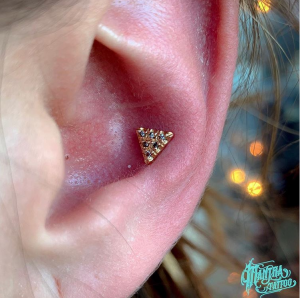
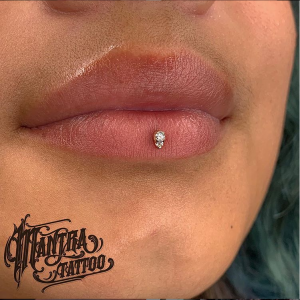
Often times people will be concerned by some of the things that occur with a piercing during the healing process. Below is a list of some of these things which are completely normal to experience during your healing phase. Of course, our piercers at Mantra are always here to help guide you through the process. So if you are ever concerned, please never hesitate to come in to the shop to let us assist you! Better to ask questions that to do something that might endanger the health of your piercing.
What is Normal?
• During healing: some discoloration, itching, secretion of a whitish-yellow fluid (not pus) that will form some crust on the jewelry. The tissue may tighten around the jewelry as it heals.
• Once healed: the jewelry may not move freely in the piercing; do not force it. If you fail to include cleaning your piercing as part of your daily hygiene routine, normal but smelly bodily secretions may accumulate.
• A piercing may seem healed before the healing process is complete. This is because tissue heals from the outside in, and although it feels fine, the interior remains fragile. Be patient, and keep cleaning throughout the entire healing period.
• Even healed piercings can shrink or close in minutes after having been there for years! This varies from person to person; if you like your piercing, keep jewelry in—do not leave it empty.
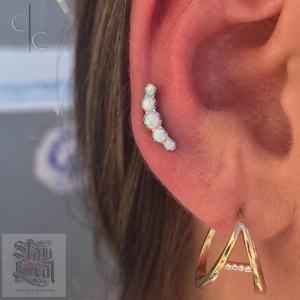
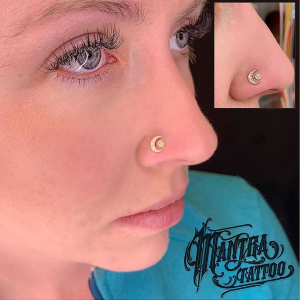
What To Do
• Stay healthy; the healthier your lifestyle, the easier it will be for your piercing to heal. Get enough sleep and eat a nutritious diet. Exercise during healing is fine; listen to your body.
• Make sure your bedding is washed and changed regularly. Wear clean, comfortable, breathable clothing that protects your piercing while you are sleeping.
• Showers tend to be safer than taking baths, as bathtubs can harbor bacteria. If you bathe in a tub, clean it well before each use and rinse off your piercing when you get out.
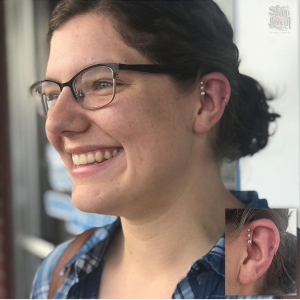
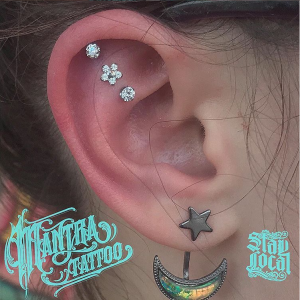
What To Avoid
• Avoid cleaning with Betadine®, Hibiciens®, alcohol, hydrogen peroxide, Dial® or other soaps containing triclosan, as these can damage cells. Also avoid ointments as they prevent necessary air circulation.
• Avoid Bactine®, pierced ear care solutions and other products containing Benzalkonium Chloride (BZK). These can be irritating and are not intended for long term wound care.
• Avoid over-cleaning. This can delay your healing and irritate your piercing.
• Avoid undue trauma such as friction from clothing, excessive motion of the area, playing with the jewelry, and vigorous cleaning. These activities can cause the formation of unsightly and uncomfortable scar tissue, migration, prolonged healing, and other complications.
• Avoid all oral contact, rough play, and contact with others’ bodily fluids on or near your piercing during healing.
• Avoid stress and recreational drug use, including excessive caffeine, nicotine, and alcohol.
• Avoid submerging the piercing in unhygenic bodies of water such as lakes, pools, hot tubs, etc. Or, protect your piercing using a waterproof wound-sealant bandage (such as 3M™ Nexcare™ Clean Seals). These are available at most drugstores.
• Avoid all beauty and personal care products on or around the piercing including cosmetics, lotions, and sprays, etc.
• Don’t hang charms or any object from your jewelry until the piercing is fully healed.
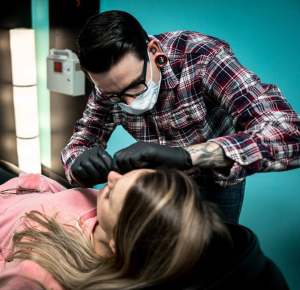
Hopefully this refresher provided you with answers to some of the more common questions you might have regarding healing your new piercing. We are here for you 7 days a week and take piercings on a walk-in basis regularly. If you prefer to schedule an appointment, you can always call the shop to inquire about availability.
At Mantra Tattoo, we have a team of amazing piercers that can help you get the piercing to suit your personal anatomy and individuality.
Check their piercing portfolio to get inspired. You can also come down to the shop to speak with one of our artists and get your new tattoo started today! The shop is open every day and we welcome walk-ins.
– Instagram: @piercings_by_coryclinton
– Facebook.com/mantratattoo303
– Aftercare instructions can be found on the APP website: https://www.safepiercing.org/aftercare.php

